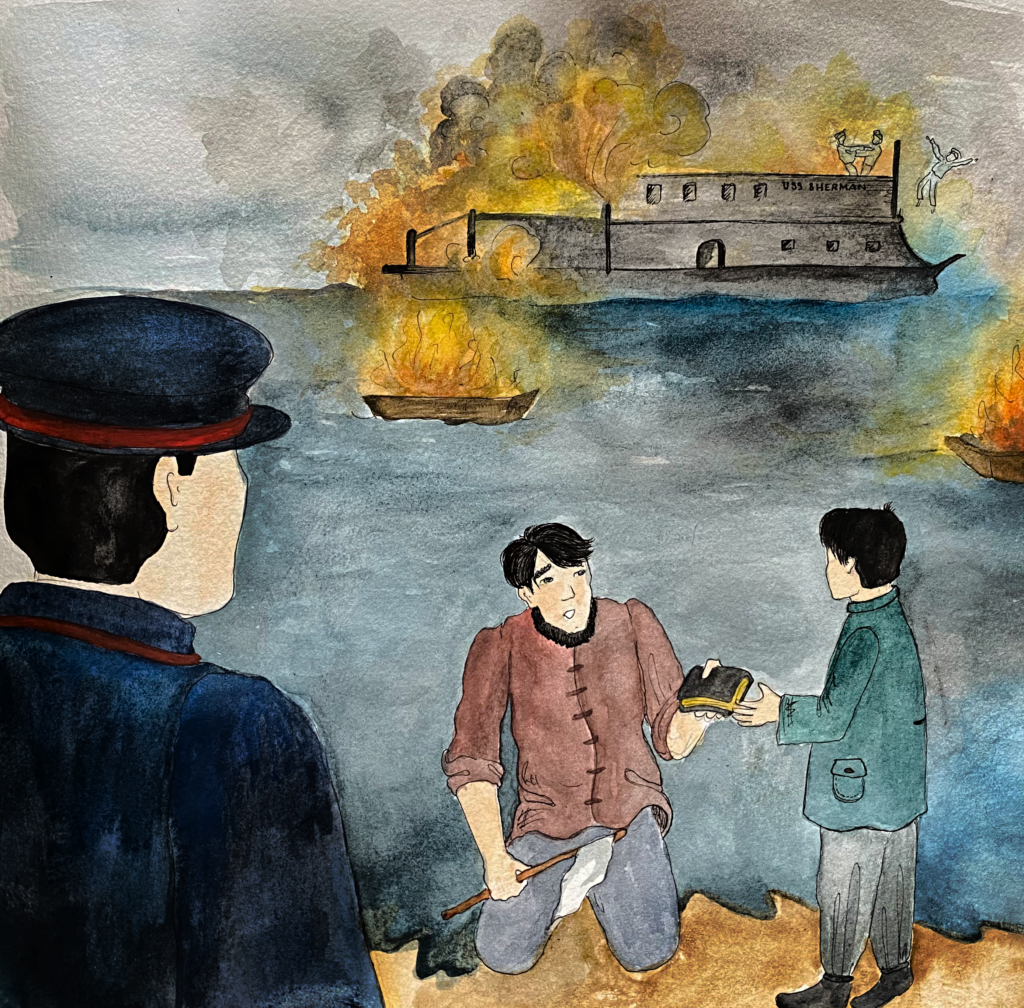Everyone thought that Robert was too young to be a missionary. “The excitement will pass with time.” they said of the newly saved boy. But it did not. Before Robert was 18, he had completed his studies at New College, London University, worked with a physician for 6 months and began preaching at his father’s chapel.
Robert was born in the small village of Rhayader, Wales in 1840. His father was a clergyman. He was a bright boy with a passion for God’s word.
Soon after the young Welshman had been ordained as a minister he found the love of his life, Caroline Godfrey. Caroline shared Robert’s vision for the mission field and said ‘yes’ to his marriage proposal and God’s call to Shanghai, China.
The newly wed couple arrived at their destination in late 1863. Robert was disgusted with the filth of their new home and went to a nearby city to look for better accommodations for his pregnant wife. He left Caroline in the care of friends. To his utter dismay, Robert returned home to find that Caroline had miscarried and died. He was so crushed by her death that he wrote a letter of resignation to the London Missionary Society saying at the close, “I thank God for her peaceful, painless end, and say, ‘The Lord gave, the Lord hath taken away, blessed be the name of the Lord.”
Part of his decision to resign from LMS was a growing disappointment in the society for their over-caution in sharing the gospel and leaving the relative safety of Shanghai. He left for Chefoo near the borders of Korea and found a job as a customs officer which was easy because of his talent with languages. Here he connected with other like-minded missionaries. One was Alexander Williamson who introduced Robert to two Catholic Korean travelers. They had heard and believed in the gospel but had never read the Bible. In those days Korea was known as the ‘Hermit Kingdom’ because the government was afraid of foreign influences and forbade western contact. Reminders to shun foreigners were everywhere; people who gave or received foreign literature were put to death.
This new challenge rekindled Robert’s missionary spirit. It was irresistible. With the help of the Scottish Missionary Society, he collected a large number of Chinese Bibles. What do you think he had in mind?
‘God moves in a mysterious way, His wonders to perform. He plants his footsteps in the sea, and rides upon the storm.’
Because he already had a position as a customs officer, in 1865, Robert was allowed to enter Korea and stay for several months learning the language. He was surprised that even a few people accepted Bibles. “As these books are taken at the risk of decapitation, or at least fines and imprisonment,” he wrote in a letter, “it is quite fair to conclude that the possessors wish to read them.”
In 1866, Catholics were under fierce persecution from the Korean government. At least 8,000 were killed. Despite this,Thomas planned a second trip into the Hermit Kingdom. He took the only available transport- an American trading ship The Sherman.
Robert, dressed in his Korean clothes, preached and distributed Bibles at every stop along the Korean coast. Many of the people were friendly toward this man who dressed and spoke like them. A few locals who were hired as navigators warned the captain that the ship was not welcome in the area. On top of this, the waters were getting shallow! The captain ignored the warning and kept going until the ship almost reached Pyongyang.
A group of angry Koreans were watching for the ship’s arrival. They met the ship and attempted to block it. At this point, the captain had become quite uneasy and tried to return the ship to the ocean. But just like the locals had warned, the water was too shallow. They were stuck- just miles between land and sea.
From where he stood on deck, Robert noticed men filling flat boats with tinder, setting it on fire and floating them near the larger stronger ship that was full of gunpowder. Knowing what was about to happen, Robert ran below deck to his cabin, grabbed a white flag and all the Bibles he could carry and hurried back on deck. Hardly stopping to think about what he was doing, Robert dove overboard. Behind him the ship exploded creating a small diversion that allowed him to get away.
Robert reached the shore where he was met by a Korean soldier holding a sword. A young boy stood near the soldier. The young missionary held out the last Chinese Bible saying in Korean, “Please take it.” He knelt down to receive the executioner’s blow.
I can only imagine that Robert Jermain Thomas’s last prayer was for this soldier, for this land. Little did he know that the end of his life would mark the beginning of other’s. Like his Savior, he died that some might live. His story does not end here.
Once the soldiers had cleared away, many locals snuck Bibles from the shore and took them home. When an edict demanded the destruction of any Bibles a few days later, one man disobeyed. This government official, Pak-Yong-Sik had used the Bible as wallpaper for his house. Years later the house was bought by Choi Chi Ryang who had been eleven years old when Robert was killed. He vividly remembered the event. Through the writing on the wall he and many guests came to believe in the Lord Jesus Christ as their Savior. Despite restrictions, Christianity spread in Korea. Just fifteen years after Robert’s death, there was a solid Christian community, about 100 churches in Pyongyang and growing revivals. Robert Jermain Thomas is remembered and respected as Korea’s first Protestant missionary. Never again would Korea be called the Hermit Kingdom.
What can you do to share God’s word with the lost?
“Most assuredly, I say to you, unless a grain of wheat falls into the ground and dies, it remains alone; but if it dies, it produces much grain.”
John 12: 24




